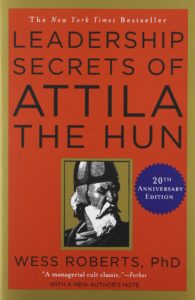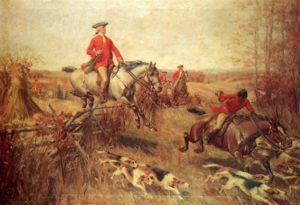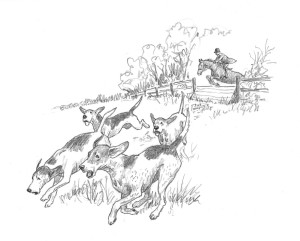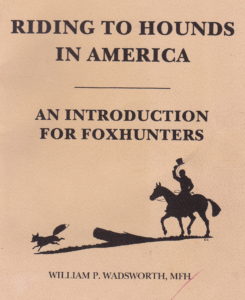 Can foxhunting really be used as an example for improving your love life and your love of life? Or is The Foxhunter’s Guide to Life & Love just a silly premise behind a cutesy title?
Can foxhunting really be used as an example for improving your love life and your love of life? Or is The Foxhunter’s Guide to Life & Love just a silly premise behind a cutesy title?
To answer those questions, let’s consider another book that used a seemingly odd metaphor yet became a New York Times bestseller and, in the artfully selected words from a review in Forbes Magazine, earned the status of “a managerial cult classic.”*
In his 1989 debut effort, Leadership Secrets of Attila the Hun, Wess Roberts takes a flimsy metaphor, sketches out improbable scenes, and puts his own words into the mouth of a historical figure who left no record of anything he’d ever said. The “secrets” Roberts attributes to his imagined Attila are at best trite and in many instances run contradictory to what a good leader should do. There are also multiple contradictions where “Attila” dispenses counsel to his lieutenants on one page and then directly contradicts himself a few pages later.
 Yet this “turkey,” as the Forbes reviewer dubbed it, went on to sell over 500,000 copies. Why? Two reasons: An endorsement by Ross Perot and a catchy title. (An article in the New York Times, 8/5/87, states that “Rick Horgan, the senior editor who acquired the 85-page book for Warner, said that people were immediately intrigued by the book’s title.”)
Yet this “turkey,” as the Forbes reviewer dubbed it, went on to sell over 500,000 copies. Why? Two reasons: An endorsement by Ross Perot and a catchy title. (An article in the New York Times, 8/5/87, states that “Rick Horgan, the senior editor who acquired the 85-page book for Warner, said that people were immediately intrigued by the book’s title.”)
While The Foxhunter’s Guide to Life & Love does not yet have the endorsement of someone with Perot’s star-making clout (or at least the clout he had thirty years ago before becoming a caricature of himself), it has one thing in common with Roberts’ successful if widely ridiculed book: An evocative, eye-catching title.
More significantly, though, is that when you open this book you’ll then find solid, sensible, usable, practical, inspirational advice. It’s a metaphor for relationships and life that works. The lessons are time-honored and have brought joy, purpose, and fulfillment to generations.
 Jumping from Attila the Hun to another notable figure from history, we come to George Washington, an avid foxhunter who kept his own pack of hounds at Mount Vernon. Washington’s tenacity and toughness as a foxhunter translated directly to his stamina and leadership skills when the Revolution called him away from Mount Vernon to lead the Continental Army. It may only be a slight stretch to posit that Washington’s enthusiasm for foxhunting was a contributing factor to the Colonials’ ultimate victory over the vastly superior forces of the British Empire. To stretch the point a bit more, if not for the qualities Washington developed through many years of riding to hounds, there might not be a United States of America as we know it today.
Jumping from Attila the Hun to another notable figure from history, we come to George Washington, an avid foxhunter who kept his own pack of hounds at Mount Vernon. Washington’s tenacity and toughness as a foxhunter translated directly to his stamina and leadership skills when the Revolution called him away from Mount Vernon to lead the Continental Army. It may only be a slight stretch to posit that Washington’s enthusiasm for foxhunting was a contributing factor to the Colonials’ ultimate victory over the vastly superior forces of the British Empire. To stretch the point a bit more, if not for the qualities Washington developed through many years of riding to hounds, there might not be a United States of America as we know it today.
Compare that enduring legacy to what Attila the Hun left behind. After Attila’s death no comparable leader rose to take his place and the Huns soon became disjointed, misdirected, fractionalized, and ultimately defeated. If Attila had truly offered sound leadership secrets, his legacy would have carried on and the history books would be filled with the glories of the long-lasting Hunnish Empire. Instead, no such empire arose and the quick dissolution of Attila’s hordes testifies to the hollowness of Wess Roberts’ use of this metaphor for his supposed advice. Yet with a catchy title and a few word from Ross Perot, over 500,000 copies found their way into the hands of eager readers.
Who makes a better example for a life well lived and a lasting legacy, Attila the Hun or George the Hunter? Attila battled the Roman Empire and enjoyed brief success, but his cause ultimately failed and his people faded into historical irrelevance. George Washington, an avid chaser of foxes, battled the British Empire and won. He then went on to help establish a nation that became a beacon of opportunity and freedom throughout the world. More than two hundred years later that nation still stands as a dominant force, and George Washington’s favorite pastime is still practiced today by a dedicated group of followers.
If foxhunting worked for Washington, the metaphor can work for anyone today who wants to improve their love life and their love of life.
I will, though, grant one nod to Attila, a point that Wess Roberts failed to mention: The man must surely have looked good on a horse.
*In his 1989 review of Leadership Secrets of Attila the Hun, Joe Queenan told of how 17 publishers had turned down this “turkey” before a self-published copy found its way into the hands of Ross Perot, then on the board of GM. Perot loved it and his endorsement inspired Warner Books to pick it up and it soon became, in Queenan’s words, “an inadvertent managerial cult classic.” The word “inadvertent” magically disappeared from the blurb that continues to appear on the book’s cover. In a 2007 essay in the Sunday Book Review, Queenan referred to Leadership Secrets of Attila the Hun as “peerlessly idiotic.”



